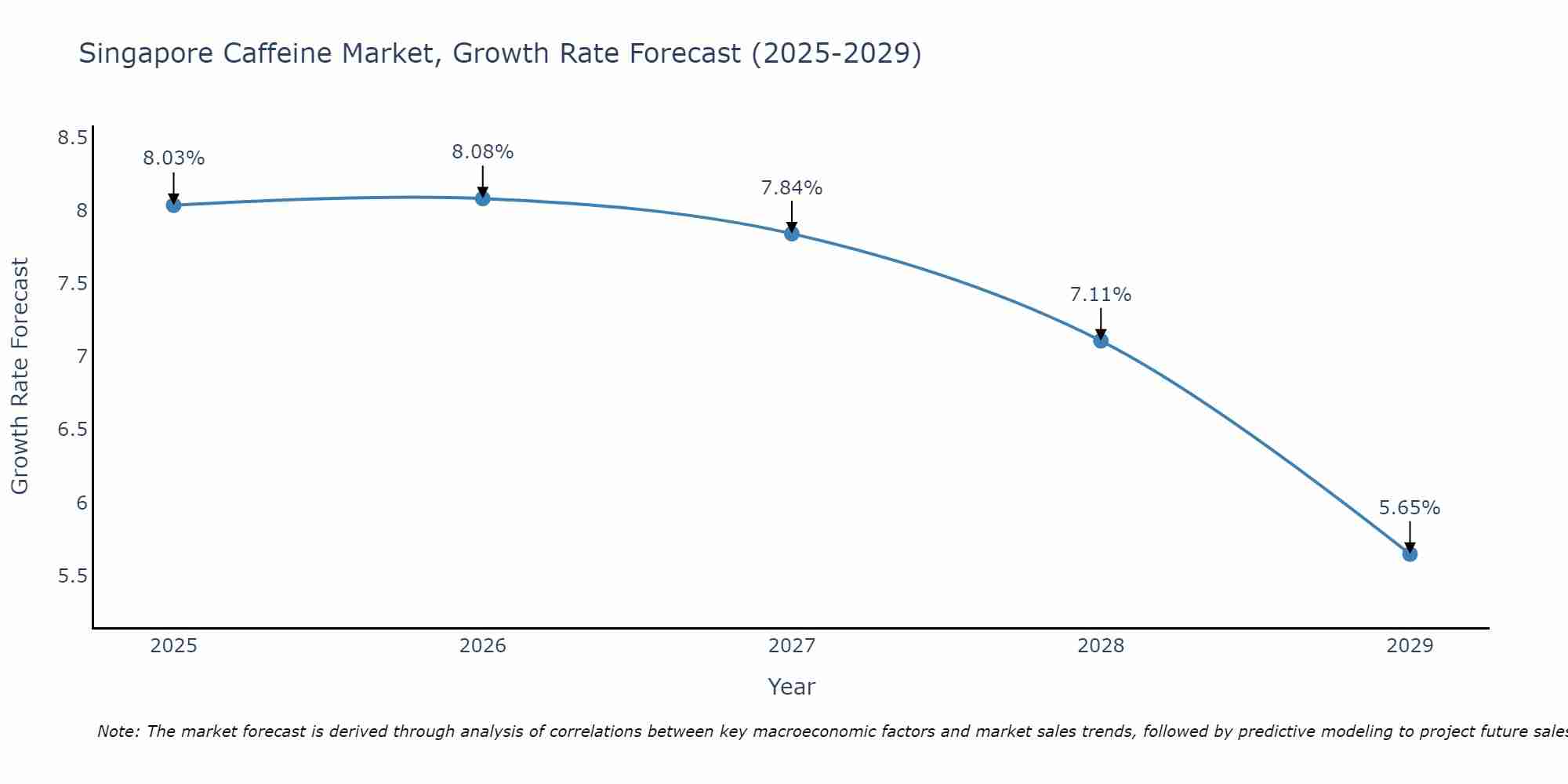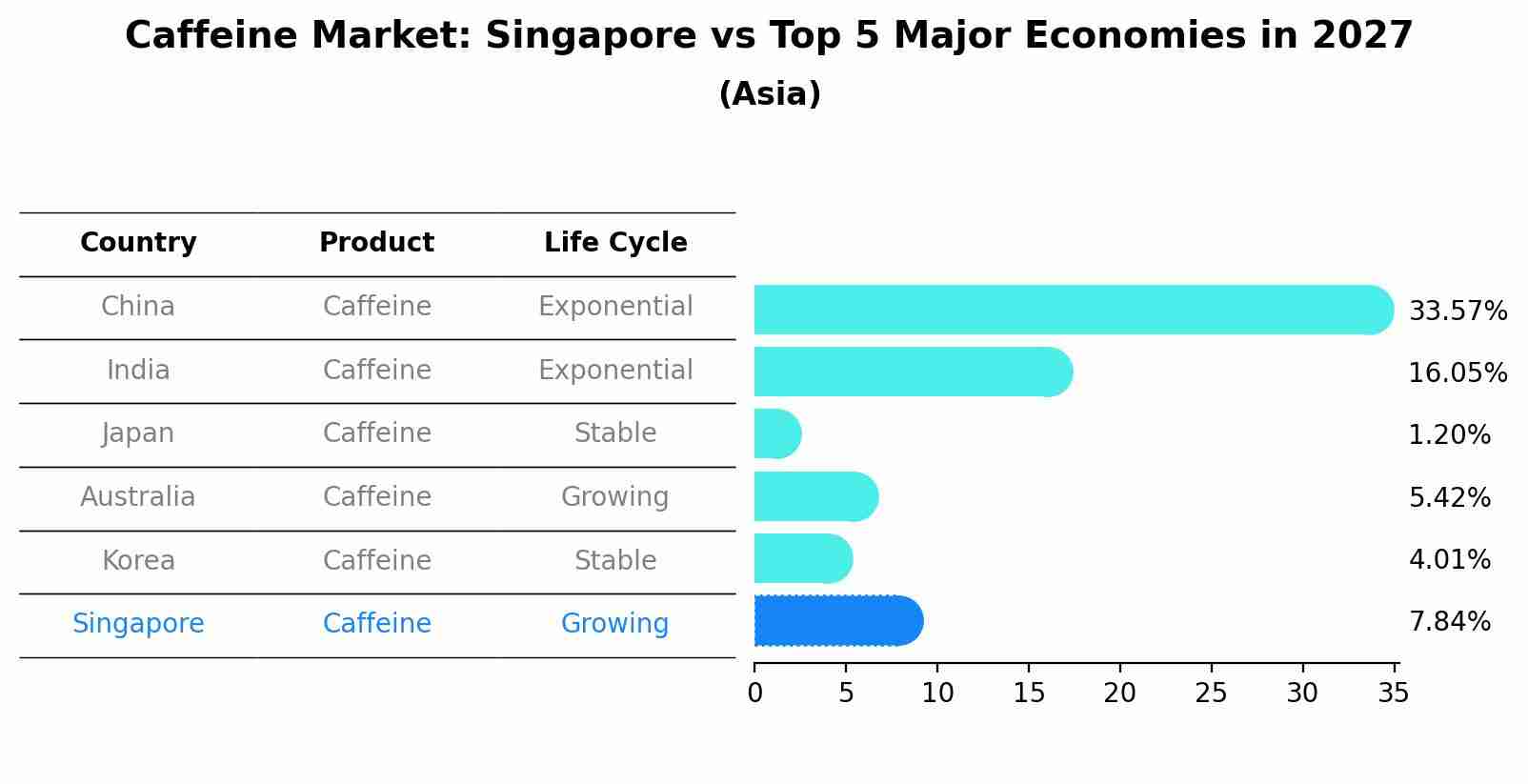Singapore Caffeine Market (2025-2031) Outlook | Industry, Growth, Share, Analysis, Size, Revenue, Value, Forecast, Trends & Companies
| Product Code: ETC110026 | Publication Date: Jun 2021 | Updated Date: Apr 2025 | Product Type: Report | |
| Publisher: 6Wresearch | Author: Ravi Bhandari | No. of Pages: 70 | No. of Figures: 35 | No. of Tables: 5 |
Singapore Caffeine Market Size Growth Rate
The Singapore Caffeine Market is projected to witness mixed growth rate patterns during 2025 to 2029. The growth rate begins at 8.03% in 2025, climbs to a high of 8.08% in 2026, and moderates to 5.65% by 2029.

Caffeine Market: Singapore vs Top 5 Major Economies in 2027 (Asia)
In the Asia region, the Caffeine market in Singapore is projected to expand at a growing growth rate of 7.84% by 2027. The largest economy is China, followed by India, Japan, Australia and South Korea.

Singapore Caffeine Market Synopsis
The caffeine market in Singapore has been experiencing steady growth over the years, primarily driven by the increasing demand for coffee and energy drinks among the urban population. The country`s vibrant cafe culture, coupled with a rising awareness of the various health benefits associated with caffeine consumption, has fueled this trend. Coffee shops and specialty cafes have proliferated in major urban centers like Singapore City, offering a wide range of coffee beverages and caffeine-infused products. Additionally, the health and wellness sector has witnessed a surge in demand for caffeine-containing supplements and skincare products. As consumers seek convenience and premium experiences, the market is expected to witness further diversification and innovation, with companies exploring sustainable sourcing practices and eco-friendly packaging to cater to environmentally conscious consumers.
Drivers of the Market
The caffeine market in Singapore is closely tied to the food and beverage industry, primarily driven by the demand for caffeinated beverages like coffee and tea. With the growing coffee culture and the emergence of specialty coffee shops, the demand for high-quality coffee beans and products containing caffeine is on the rise. The market outlook for caffeine remains positive due to changing consumer preferences and the popularity of energy drinks.
Challenges of the Market
The Singapore caffeine market faces challenges related to changing consumer preferences and health concerns. While caffeine is widely consumed in beverages like coffee and tea, there is a growing demand for healthier and caffeine-free alternatives. Moreover, concerns about excessive caffeine consumption and its impact on health have prompted regulatory scrutiny. To overcome these challenges, the caffeine industry in Singapore should diversify its product offerings, invest in innovative formulations, and engage in transparent communication about caffeine`s benefits and potential risks.
COVID-19 Impact on the Market
The caffeine market in Singapore faced disruptions during the pandemic, primarily due to reduced demand from the food and beverage industry. As restaurants and cafes reopened, the market began to recover. The growing trend of specialty coffee and energy drinks is expected to drive demand in the post-pandemic era.
Key Players in the Market
The Singapore caffeine market is anticipated to grow steadily, driven by the beverage and pharmaceutical industries. Key players in this market include CSPC Pharmaceutical Group, Shandong Xinhua Pharmaceutical, and Taj Pharmaceuticals.
Key Highlights of the Report:
- Singapore Caffeine Market Outlook
- Market Size of Singapore Caffeine Market, 2024
- Forecast of Singapore Caffeine Market, 2031
- Historical Data and Forecast of Singapore Caffeine Revenues & Volume for the Period 2021-2031
- Singapore Caffeine Market Trend Evolution
- Singapore Caffeine Market Drivers and Challenges
- Singapore Caffeine Price Trends
- Singapore Caffeine Porter's Five Forces
- Singapore Caffeine Industry Life Cycle
- Historical Data and Forecast of Singapore Caffeine Market Revenues & Volume By Type for the Period 2021-2031
- Historical Data and Forecast of Singapore Caffeine Market Revenues & Volume By Natural Caffeine for the Period 2021-2031
- Historical Data and Forecast of Singapore Caffeine Market Revenues & Volume By Synthetic Caffeine for the Period 2021-2031
- Historical Data and Forecast of Singapore Caffeine Market Revenues & Volume By Applications for the Period 2021-2031
- Historical Data and Forecast of Singapore Caffeine Market Revenues & Volume By Pharmaceuticals for the Period 2021-2031
- Historical Data and Forecast of Singapore Caffeine Market Revenues & Volume By Food for the Period 2021-2031
- Historical Data and Forecast of Singapore Caffeine Market Revenues & Volume By Beverages for the Period 2021-2031
- Historical Data and Forecast of Singapore Caffeine Market Revenues & Volume By Flavours and Fragrances for the Period 2021-2031
- Singapore Caffeine Import Export Trade Statistics
- Market Opportunity Assessment By Type
- Market Opportunity Assessment By Applications
- Singapore Caffeine Top Companies Market Share
- Singapore Caffeine Competitive Benchmarking By Technical and Operational Parameters
- Singapore Caffeine Company Profiles
- Singapore Caffeine Key Strategic Recommendations
Frequently Asked Questions About the Market Study (FAQs):
- Single User License$ 1,995
- Department License$ 2,400
- Site License$ 3,120
- Global License$ 3,795
Search
Thought Leadership and Analyst Meet
Our Clients
Related Reports
- Afghanistan Apparel Market (2026-2032) | Growth, Outlook, Industry, Segmentation, Forecast, Size, Companies, Trends, Value, Share, Analysis & Revenue
- Canada Oil and Gas Market (2026-2032) | Share, Segmentation, Value, Industry, Trends, Forecast, Analysis, Size & Revenue, Growth, Competitive Landscape, Outlook, Companies
- Germany Breakfast Food Market (2026-2032) | Industry, Share, Growth, Size, Companies, Value, Analysis, Revenue, Trends, Forecast & Outlook
- Australia Briquette Market (2025-2031) | Growth, Size, Revenue, Forecast, Analysis, Trends, Value, Share, Industry & Companies
- Vietnam System Integrator Market (2025-2031) | Size, Companies, Analysis, Industry, Value, Forecast, Growth, Trends, Revenue & Share
- ASEAN and Thailand Brain Health Supplements Market (2025-2031) | Strategy, Consumer Insights, Analysis, Investment Trends, Opportunities, Growth, Size, Share, Industry, Revenue, Segments, Value, Segmentation, Supply, Forecast, Restraints, Outlook, Competition, Drivers, Trends, Demand, Pricing Analysis, Competitive, Strategic Insights, Companies, Challenges
- ASEAN Bearings Market (2025-2031) | Strategy, Consumer Insights, Analysis, Investment Trends, Opportunities, Growth, Size, Share, Industry, Revenue, Segments, Value, Segmentation, Supply, Forecast, Restraints, Outlook, Competition, Drivers, Trends, Demand, Pricing Analysis, Competitive, Strategic Insights, Companies, Challenges
- Europe Flooring Market (2025-2031) | Outlook, Share, Industry, Trends, Forecast, Companies, Revenue, Size, Analysis, Growth & Value
- Saudi Arabia Manlift Market (2025-2031) | Outlook, Size, Growth, Trends, Companies, Industry, Revenue, Value, Share, Forecast & Analysis
- Uganda Excavator, Crane, and Wheel Loaders Market (2025-2031) | Strategy, Consumer Insights, Analysis, Investment Trends, Opportunities, Growth, Size, Share, Industry, Revenue, Segments, Value, Segmentation, Supply, Forecast, Restraints, Outlook, Competition, Drivers, Trends, Demand, Pricing Analysis, Competitive, Strategic Insights, Companies, Challenges
Industry Events and Analyst Meet
Whitepaper
- Middle East & Africa Commercial Security Market Click here to view more.
- Middle East & Africa Fire Safety Systems & Equipment Market Click here to view more.
- GCC Drone Market Click here to view more.
- Middle East Lighting Fixture Market Click here to view more.
- GCC Physical & Perimeter Security Market Click here to view more.
6WResearch In News
- Doha a strategic location for EV manufacturing hub: IPA Qatar
- Demand for luxury TVs surging in the GCC, says Samsung
- Empowering Growth: The Thriving Journey of Bangladesh’s Cable Industry
- Demand for luxury TVs surging in the GCC, says Samsung
- Video call with a traditional healer? Once unthinkable, it’s now common in South Africa
- Intelligent Buildings To Smooth GCC’s Path To Net Zero


















